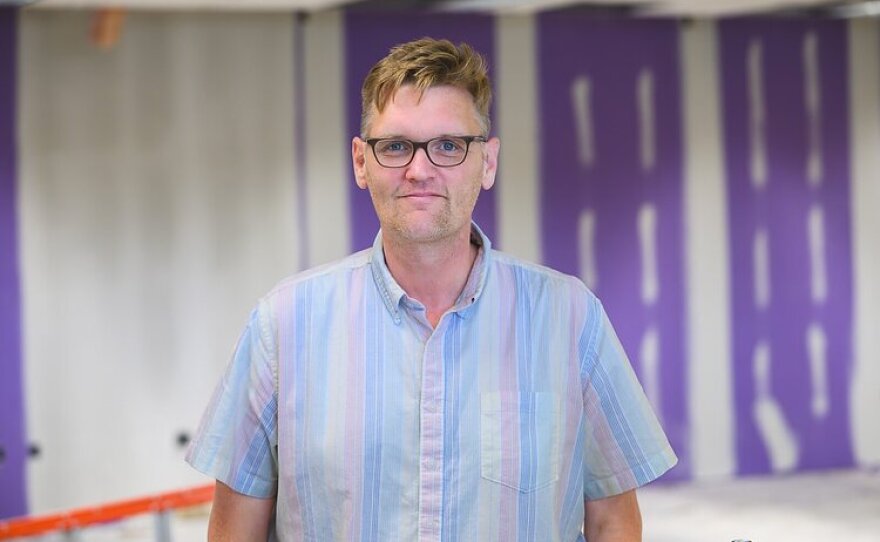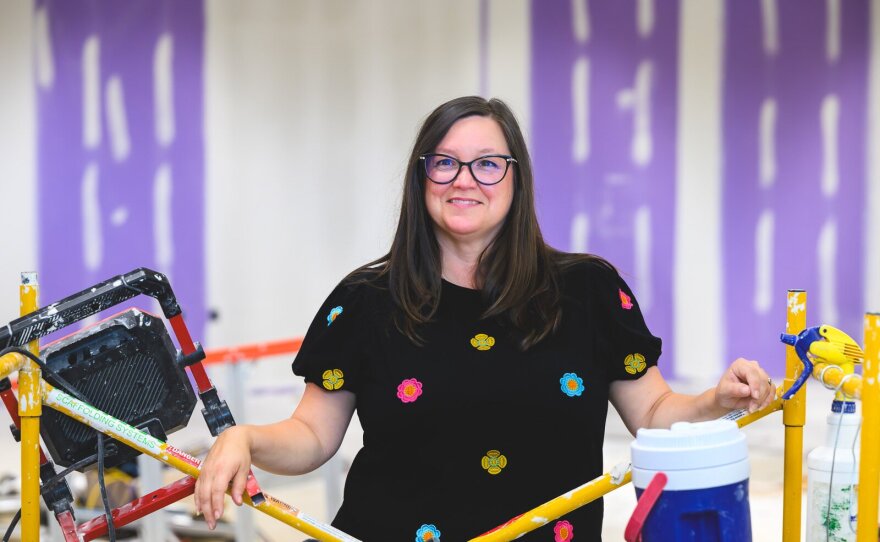Resources:
Sarah Rigg's Feature Article: <i>EMU library undergoes major renovation thanks to its namesake's foundation</i>
<i>Eastern Michigan University</i>
<i>Halle Library First Floor Renovation</i>
<i>Diane and Bruce Halle Foundation</i>
Transcription:
Rylee Barnsdale: You're listening to 89 one WEMU. I'm Rylee Barnsdale, and this is On the Ground Ypsi. Thanks to a generous donation from the Diane and Bruce Halle Foundation, EMU's Halle Library has been undergoing renovations since April with the project scheduled to be completed later this summer. Taking full advantage of this newfound space will be EMU's University Archives and Oral History program, as they migrate from the library's third floor to its ground floor. And they have some exciting things planned for the future because of it. With me today is EMU University archivist and Halle Library Department head Alexis Braun Marks to go over what things are now possible for the program due to its prime new location and additional space. Hi, Alexis! Thanks so much for being here!
Alexis Braun Marks: Thank you for having me!
Rylee Barnsdale: So, these new renovations at Halle--they're pretty significant. Classrooms, recording booths, a gallery space, other campus resources are relocating to the library now. Were the archives and the oral history program involved in the conversations regarding who was moving where? Where did the decision to move down to the main floor really come from?
Alexis Braun Marks: So, I think a lot of the conversation came out of the University Foundation, right in conversation with the Halle Foundation, trying to identify spaces for some of our centers, in particular: so the Center for Jewish Studies, the Center for Civil Rights and Social Justice, and then sort of looking at the other services that the library provides and the different programs that have the potential for community partnership, which is really where the oral history program and the University Archives falls into, right? So, we see ourselves as a community resource, first and foremost. We want people to come and use our resources. We're really interested in documenting the community. And so, that was part of the intent of bringing us down to the first floor was to give the oral history program a more visible home. And it's really hard to tease out the oral history program from the university archives. So, making sure that we're all together still felt like a really important part of that process.
Rylee Barnsdale: I'm sure those relationships across campus entities kind of were already there. What does it really mean to have all of these resources, including the ones that were already in the library, all under one roof?
Alexis Braun Marks: What we've recognized since the pandemic is those passing conversations can be incredibly impactful and fruitful. And so, when we're all in the same space and crossing paths, whether that's faculty members coming to the faculty development center for a workshop or community members coming to one of the centers, researchers, undergraduate students coming into the archives, students coming to use the writing center services or the academic project center services, having everyone in a singular space and being easily redirected instead of having to say to somebody, "well if you go down the hallway around the corner and then in the back left corner, you'll find such and such," we'll be able to have really clear sight lines for people to just say, "Archives is over there." Everything you need is in one spot. You can find whoever it is that you want to talk to. We'll get you connected to the resources that you need.
Rylee Barnsdale: And I'd love to get a bit of a better idea of the scope of this move for the archives and for the oral history program. How does this new space really compare to what the program was operating in before? What are the big changes that you can talk about now?
Alexis Braun Marks: Yeah. So, I've been with the university since 2011, and I think we had a really strong foundation for a university archives program. And what we've been able to do with our existing space is to take a storage room and turn it into a reading room and to take our former reading room and turn it into a work room. But what's happened is our programs have grown, and our reading room has to serve dual purposes, right? So, it ends up being an overflow workspace and a meeting space when we meet with faculty and community members. And if we have a history class, who's using the archives for a semester-long project, if they're in the archives, then that means that a researcher coming from an east or west coast can actually be in the reading room at the same time as the class. And so, we'll have a classroom that's separate from the reading room, that's separate from the oral history work offices, that are separate from a recording space. And so, we're not going to be asking one room to serve as a multi-purpose room. We'll have all of the individual spaces that we need to meet the needs of our growing program.
Rylee Barnsdale: I feel like that really opens up the doors to even more campus collaborations, too.
Alexis Braun Marks: Absolutely. Yeah. I mean, I think that's our hope, right? We've been working more and more with classes outside of disciplines of history, whether that's the art department or journalism. And so, being able to cater to more than just one class at a time is a really exciting possibility for us.
Rylee Barnsdale: This is WEMU's On the Ground Ypsi. I'm Rylee Barnsdale talking with EMU University archivist Alexis Braun Marks. Alexis, with all this new space you described, how are some other ways that the archives and oral history programs planned to maybe change or expand?
Alexis Braun Marks: Yeah, I think once we get settled into our spaces, right, it's like any major move. We'll get all the boxes unpacked, and we'll hang the pictures on the wall. And I think working really closely with the oral history program coordinator, Matt Jones, looking at all the different ways that we can be expanding into the community and writing grants to do specific documentation projects. Having this new space is going to allow us to really strengthen those partnerships that we've been laying the groundwork for for quite a while, but it just means we'll have space for people to come in where they feel welcome. It's easier for them to find. We're not trying to redirect them in a million different places.
Rylee Barnsdale: Sure.
Alexis Braun Marks: And then, also having the gallery space next to that means that we can have a lot more community engagement and crossover, right, so that you could have an exhibit that incorporates oral history, archival resources, student work, etc., all in one space.
Rylee Barnsdale: And is there really anything that you as an archivist wanted to do with this program on campus that you can do now versus maybe something you couldn't do before with the space that you already had? Are there any projects we can get a sneak peek of that you maybe want to get started on?
Alexis Braun Marks: Yeah, I think we've been able to do so much in the space that we have in the time that I've been here, and I'm incredibly proud of the program that we've built--the oral history program being a major component of that, but also just the work that we do with graduate students and undergraduate students and mentoring them. And I think showing them the investment that the university and the Halle Foundation has made in the university archives goes a long way to putting their money where their mouth is of the importance of the history of the university, the legacy of this institution, the important role they've played in the Ypsilanti community. And so, overall, I think we've worked really, really hard for this. And so, I'm excited to see us grow into this new space.
Rylee Barnsdale: This is WEMU's On the Ground Ypsi. I'm talking with Alexis Braun Marks, EMU University archivist and department head at Halle Library. Alexis, as you mentioned earlier, this is a resource that isn't just for EMU students and folks on campus, but it is really for the whole community. Are there any current partnerships that you have with community members that are really going to benefit from this expansion that this program is undergoing?
Alexis Braun Marks: Yeah. So, I think getting us into a space that is more visible allows us to meet our mission as a public institution and a public archives, right? We want the entire general public to feel welcome in our space and to know that our records are accessible to them. And as far as working with new partners, I mean, our hope is that the relationships that we're building, whether that's with Ypsi Pride or other faculty on campus that are working in their own disciplines in communities, whether that's women journalists or historically Black universities, that all of that will sort of culminate in an instructional space, a space where people can come and learn and share ideas. And that we'll have enough of that space that we can be welcoming to anyone who's interested.
Rylee Barnsdale: And how can these folks engage with the archives and the oral history program? Is it just a matter of coming in once everything is all put together, or are there other opportunities for folks to get involved with the program and maybe help you guys out with some of the work that you're doing?
Alexis Braun Marks: Yeah, absolutely! So, let us get our boxes unpacked. I would say after Labor Day is probably the safest time to reach out and know that we're going to be pretty settled. Anyone who's interested in partnering with the archives is welcome to email just our general email address. You can find that emich.edu/universityarchives. We'll direct you to our website. All of our contact information is there. My contact information, Matt Jones, the coordinator of the oral history program, and the other amazing staff members who manage our reading room, Amber Davis and Brooke Boyst.
Rylee Barnsdale: Alexis, thank you so much for being here today! This is a very exciting time for EMU's archives and oral history programs, and I'm sure that you and many others are very eager to see what things are going to look like once the dust settles and everything is finished.
Alexis Braun Marks: Yeah, we hope to see everybody in the fall, if not to visit the university archives just to see the amazing transformation of the first floor of the library. It's really exciting!
Rylee Barnsdale: For more information on today's topic and links to the full article, visit our website at wemu.org. On the Ground Ypsi is brought to you in partnership with Concentrate Media. I'm Rylee Barnsdale, and this is your community NPR station, 89 one WEMU FM, Ypsilanti.
Non-commercial, fact based reporting is made possible by your financial support. <b>Make your donation to WEMU today </b>to keep your community NPR station thriving.
Like 89.1 WEMU on <b>Facebook</b> and follow us on <b>Twitter</b>
Contact WEMU News at <i>734.487.3363</i> or email us at <i>studio@wemu.org</i>















